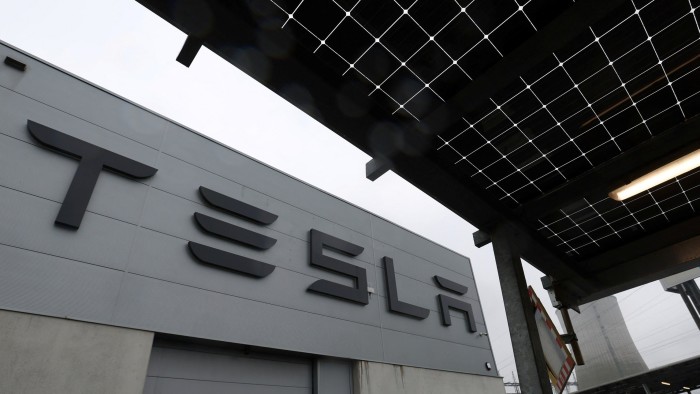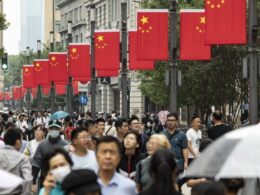Unlock the White House Watch newsletter for free
Your guide to what Trump’s second term means for Washington, business and the world
Tesla, Nissan, and makers of products as diverse as children’s lunch boxes and luxury mattresses are among the businesses urging shoppers to make purchases before Donald Trump’s tariffs hit prices, as advertisers prey on consumer fears that the White House’s trade policy will soon hit their wallets.
Prospective buyers accessing Tesla.com in Canada are greeted with a yellow banner at the top of the site: “Explore pre-tariff priced inventory while supplies last”.
Sézane, a Parisian clothing brand backed by private equity groups such as General Atlantic, on Monday emailed US shoppers warning that due to tariffs some items “may no longer be available on our US site in the coming days”.
“If any of these are still on your mind, we recommend placing your order soon to avoid missing out,” according to an email viewed by the Financial Times.
Trump’s trade war has hammered global stock markets and brought warnings of inflation and even a recession in the US economy. But for some companies, the crisis is an opportunity to sell more inventory.
It comes as a vulnerable time for marketers and advertisers as they try to lure Americans to shop even as US consumer confidence has sunk to its lowest level since May 2020.
Adam Alter, marketing professor at New York University’s Stern School of Business, said these tactics are “a simple scarcity play, and it is the oldest trick in the book”.
“The difference here, I think, is that scarcity often plays on softer human traits, the desire not to miss out on something other people might have,” he added. “Whereas in this case the appeal rests on a very real, rational, and borderline certain concern: that prices will rise dramatically and very soon.”
Omie, a California brand that sells bento-style children’s lunch boxes, this month told shoppers prices would soon rise due to a “steep increase” in import costs from China. But shoppers could use the discount code ‘BeforeTariffs’ to access lower prices for one week only.
Nissan’s luxury car brand, Infiniti, has offered similar messaging. “Invest in an Infiniti without new tariffs during the Once in a Springtime Event,” reads its US website.
A banner on the website of Mercedes-Benz in Calabasas, a wealthy Los Angeles neighbourhood, said: “No Added Tariffs. 100% Tariff Free.” Mercedes has pledged to absorb the costs of tariffs for its 2025 model cars.
Saatva, a seller of high-end mattresses, also told website visitors this week: “Don’t wait: Beat tariff increases.”
Data shows that the fears surrounding tariffs may indeed have helped boost US retail sales in March.
“It’s probably very effective messaging,” said Brian Wieser, a veteran advertising analyst and former WPP executive. “It’s probably behind some of the reported growth in retail sales that we saw in March. Those numbers were higher than you would have otherwise expected.”
Some global retailers, such as Chinese ecommerce giant Temu, have opted to pass tariff fees to consumers, adding a charge at the online checkout.
But US companies which do so risk retribution from the president, who lashed out at Amazon on Tuesday after a report that it would display the impact tariffs have on prices on its website.
White House press secretary Karoline Leavitt slammed the move as a “hostile and political act”. The company walked back the proposal after Trump spoke with Amazon founder Jeff Bezos.
“Jeff Bezos was very nice,” Trump said on Tuesday. “He solved the problem very quickly”.
Source link









